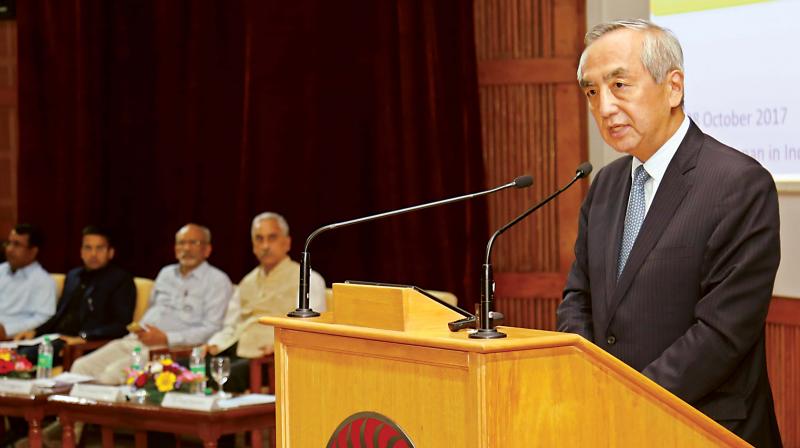Indo-Japanese ties will help enhance peace: Envoy
The Japanese Ambassador was delivering the 44th Foundation Day Lecture at Indian Institute of Management, Bengaluru.

Bengaluru: Japanese Ambassador to India, Kenji Hiramatsu, said that the recent developments in the Indo-Japanese bilateral relations will help enhance peace and prosperity in the Indo-Pacific region and the world.
“Aligning the Japanese proposal of ‘Free and Open Indo-Pacific Strategy with India’s Act East Policy’ will result in enhanced maritime security cooperation, improved regional connectivity in the Indo-Pacific and a strengthened cooperation with the Association of South East Asian Nations (ASEAN),” he said.
On Japanese PM Shinzo Abe’s visit to Gujarat last month, he said, “The magnificent sight of a number of people on the streets of Ahmedabad orchestrating the enthusiastic welcome demonstrated the resounding success of the bilateral relations and reaffirmed the strength of the two Prime Ministers’ personal bond. Various endeavours, including the High-Speed Railway project, are something that we can look forward to.”
He hoped to extend the “revolutionary technology” used in Bullet trains to conventional Indian Railways which will also ensure safety at the highest level.
“The high-speed Bullet train surviving even the deadliest of earthquakes ever experienced (9.0 on Ritcher Scale) in Japan shows the priority we give to security along with technological advancements,” he said. On the importance of aligning with more countries, including the US, on various issues, Mr Hiramatsu called for plans to strengthen trilateral cooperation frameworks to enhance diplomatic ties to address regional and global issues. “We are keen not only on the relationship between Japan and India, but also on the joint relations with US and other countries, including Australia, to ensure security, navigation, market system and other diplomatic ties to improve and enhance cooperation among nations,” he said. “I have a special interest in enhanced cooperation for collaborative start-up business between the two countries. There is a lot of synergy between the two countries and opportunities where we can collaborate with and support each other,” he said, adding that primary talks are already underway after PM Abe’s recent visit.
The Japanese Ambassador was delivering the 44th Foundation Day Lecture at Indian Institute of Management, Bengaluru, on “Japan-India Relations on a New Era: Partnership for Prosperity”.
Directors’ recalls hurdles in building IIM-B
A panel discussion on ‘Building the Indian Institute of Management Bangalore (IIMB)– A Director’s Perspective’ brought to light various challenges and unheard of stories behind the history of the Institute on its 44th Foundation Day Celebrations on Saturday.
The panel, which consisted of former IIM-B directors – Prof. K.R.S. Murthy, Prof. M. Rammohan Rao, Prof. P.G. Apte, Prof. Sushil Vachani and incumbent director Prof. G. Raghuram, was moderated by Prof. K. Kumar, Chairperson, Academic Programmes, NSRCEL.
On the challenges he faced as a director of the institute when economic reforms were introduced in 1991, Prof Murthy remembered that handling internal issues was more difficult than dealing with the changing external scenario. “With the institute being formed to train good managers for the public sector different from those at Ahmedabad (IIMA) and Kolkata (IIMC), the sudden change in the external situation gifted a difficult phase to IIMB,” he said. His successor Prof Rao said finding funds for the institute was another major challenge he faced along with what he inherited from Prof Murthy. Prof. Apte spoke about autonomy issues and balance between teaching and research, and Prof. Sushil Vachani (who joined via video conference from Boston) said that being an ‘outsider’ to the IIM system never posed a challenge. Prof. Raghuram said his motivation to take charge as Director was his aspiration to be able to express himself on multiple dimensions beyond academics, and to reach out to as many stakeholders as possible.

